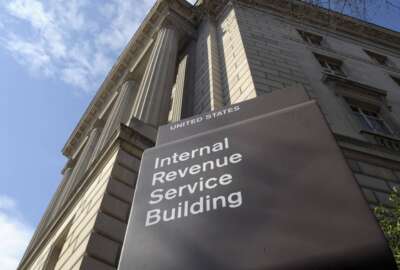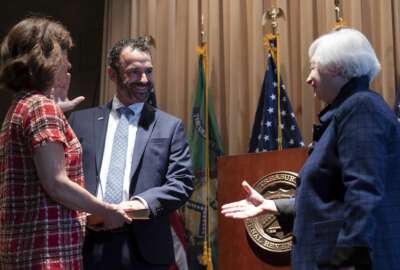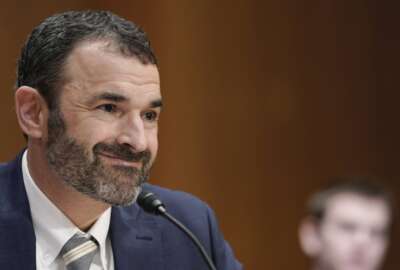

The IRS is pointing to a higher level of performance this filing season a taste of what it can do to transform the agency in the coming years.
The IRS answered millions more taxpayer calls during this year’s filing season compared to recent years, and is pointing to that higher level of performance as a taste of what it can do to transform the agency over the coming years.
The IRS this filing season, which ends on Tuesday, spent a fraction of the nearly $80 billion it received in the Inflation Reduction Act to rebuild its workforce and modernize its IT over the next decade.
Much of that initial spending went into improving the agency’s level of customer service to taxpayers. The Treasury Department said in a press release Monday that the IRS answered 87% of incoming calls this filing season, exceeding Treasury Secretary Janet Yellen’s goal of the agency answering 85% of calls.
Deputy Treasury Secretary Wally Adeyemo said Monday that the IRS is prioritizing improved taxpayer experience in both the short and long term. However, he warned efforts by House Republicans to roll back this funding would ultimately degrade the IRS’s efforts to improve service.
“The money that we got through the Inflation Reduction Act is the critical piece that’s made it easier for you to file your taxes this year. This made it easier for people to get their phone calls answered by the IRS. And if Republicans took away that money, they would make it harder for everyday Americans to get the information they need from the IRS,” Adeyemo said at the Urban-Brookings Tax Policy Center.
The National Treasury Employees Union said the IRS in fiscal 2023 has spent about $838 million, or about 1% of the nearly $80 billion in IRA funding.
NTEU National President Tony Reardon said that initial investments in taxpayer services have led to significant improvements.
“There are now signs that the IRS, after years of neglect, is rebounding,” Reardon said. “The rebuilding has just begun, but this initial progress validates the decision by Congress to reinvest in the agency that is responsible for collecting the revenue that runs our country.”
Last year, the IRS answered about 15% of incoming calls, which Adeyemo said was a “woefully poor” level of service.
IRS employees this year answered 2 million more calls than they could last year, and cut the average phone on-hold time from 27 minutes down to 4 minutes.
The IRS is also rolling out a callback option for taxpayers unable to get through to an IRS employee over the phone. The agency expects this feature will be available to 95% of taxpayers by the end of July.
The IRS also cleared its backlog of unprocessed 2022 tax returns, and is looking to stay ahead of its paper-based workload by digitizing 80 times more paper-based tax returns this year compared to the year prior.
“Today, the IRS is scanning more of that paper than they’ve ever done before because of the investments we’ve made through the Inflation Reduction Act,” Adeyemo said.
The IRS, he added, expects to be able to scan and digitize 72 of the most common forms the IRS receives, allowing agency employees to respond in minutes, rather than days.
Adeyemo said the IRS is on track to become a 21st-century agency that allows taxpayers to obtain more services and help online, “the same way you can do from your bank or any company going forward.”
The IRS plans to hire more than 10,000 employees before the end of this fiscal year, and nearly an additional 10,000 employees in fiscal 2024, according to its Strategic Operating Plan. Most of the hiring is focused on taxpayer services and enforcement.
IRS Commissioner Danny Werfel is expected to testify before the Senate Finance Committee on Wednesday and discuss the IRS’s performance during this year’s filing season and its fiscal 2024 budget request.
The IRS is looking to staff up its enforcement operations to audit high-income earners. Adeyemo said the IRS has the same level of staffing as it did in the 1970s, and that the top 1% of U.S. earners account for about $160 billion in uncollected taxes every year.
“Auditing their taxes is hard, because they have thousands and thousands of pages of stuff to go through. And by hiring these new professionals, we’re going to be in a position to better ensure that the tax code is fair,” he said.
Adeyemo said the average taxpayer making less than $400,000 annually takes about five hours to through an audit, but top earners may take up to 250 hours to complete an audit.
“The challenge, of course, is that it takes a lot longer to audit someone who makes their money in various ways than to audit somebody who makes their money through a W-2,” Adeyemo said.
To make its enforcement and audits more efficient, Adeyemo said the IRS is looking to hire a more data-savvy workforce.
“Ultimately, what we’re going to do here is we’re going to use both technology, machine learning and other methods to look at pass-throughs and other complicated ways in which people look to hide their income in order to try and close the tax gap,” he said.
Former IRS Commissioner Charles Rossotti said he agreed the IRS should focus on data and technology investments to restore its enforcement capabilities.
Rossotti said the IRS should focus on hiring “a smaller cadre of very experienced people,” and dedicate more of its multi-year funding to modernize technology, rather than focus exclusively on hiring enforcement personnel.
“They’re not going to flood the zone with revenue agents. Even if they did it, it wouldn’t make any sense to do it,” Rossotti said.
Pete Sepp, president of the nonprofit National Taxpayers Union, said the IRS is “sinking major resources” into taxpayer services, but said the agency also needs to invest more heavily into modernizing its legacy IT to make lasting changes.
“Those are the critical building blocks of any successful IRS transformation strategy,” Sepp said. “We have major problems with cementing into place the gains that the IRS hopes to make in the next couple of years in taxpayer services and business systems modernization.”
The IRS met its goal of hiring more than 5,000 customer service representatives last year. But Rossotti said it would be a challenge for the IRS to meet its goals of hiring 20,000 new personnel by the end of fiscal 2024.
“I don’t know if it’s realistic, I tend to doubt it from a purely HR standpoint,” he said.
However, he said the IRS can more effectively beef up its enforcement capabilities through improved data analytics capabilities that help the agency better understand who it needs to audit.
“My advice would be to go very slow on ramping up staffing on the enforcement side, until they’ve really figured out how they’re going to use, as they say they want to, data and technology to make that process more efficient. Otherwise, they’ll get a lot of unproductive audits, and that’s not going to be useful,” Rossotti said.
Natasha Sarin, a former counselor to Yellen, now an associate professor at Yale Law School, said the IRS will need to rethink its approach to hiring, and that the “IRS of the future is not going to look like the IRS today.”
“The type of people who need to do that work are people that the IRS has not traditionally employed. They’re data scientists, they’re people with expertise in partnership law. Where do you find that talent and how do you articulate that the IRS is an exciting place to work for people who are interested in those types of questions? [That] is going to be the greatest challenge that faces Commissioner Werfel over the course of the next few years,” Sarin said.
Former National Taxpayer Advocate Nina Olson said the IRS has yet to embrace a mission statement that embraces its service to taxpayers or its role of dispensing benefits to the public.
“The IRS is completely enforcement-minded and defines itself as an enforcement agency, first and foremost,” Olson said.
Rossotti said some elements of the IRS workforce may at first be skeptical of changes to how the agency meets its mission, but the agency may eventually win over those “naysayers” by demonstrating how these changes benefit employees.
“As things gradually are shown to work, and people are given tools, that they’re given improvements, more and more people get on the bandwagon. It’s just common sense. This is true in every organization I’ve been in, and it was equally true at the IRS,” Rossotti said.
Copyright © 2025 Federal News Network. All rights reserved. This website is not intended for users located within the European Economic Area.
Jory Heckman is a reporter at Federal News Network covering U.S. Postal Service, IRS, big data and technology issues.
Follow @jheckmanWFED



